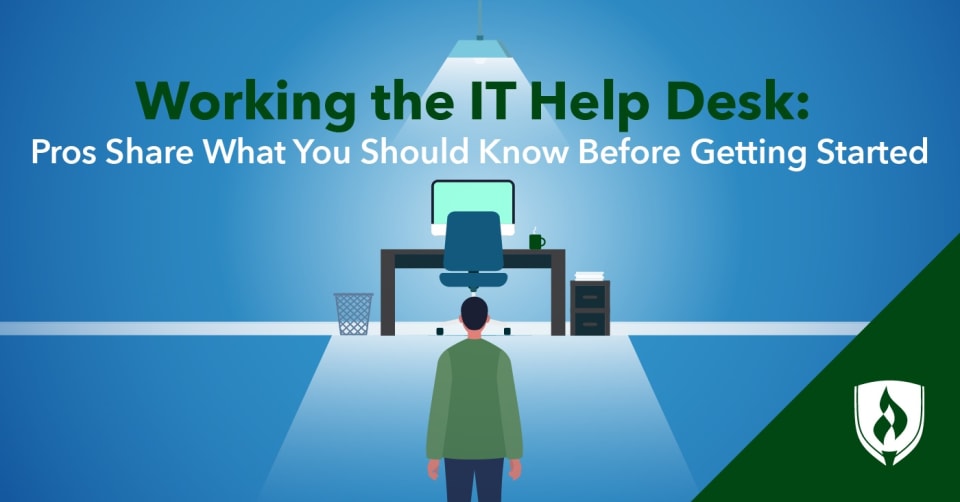Working the IT Help Desk: Pros Share What You Should Know Before Getting Started
By Ashley Brooks on 02/22/2021

You know you were made to work in the technology field. There’s just one problem: many entry-level positions seem to be IT help desk roles—and you’re really not sure if that’s how you want to earn a living.
But what if we told you that the IT help desk could be more rewarding than what you may be envisioning? Maybe you think you already know the answer to “What is help desk support?” but we’re willing to bet there’s more to the job than you’ve considered.
Ready to learn what it’s really like to work the IT help desk? Keep reading to hear from real-life IT pros on what you need to know about working the help desk before you get started.
What is help desk support?
Before we dig into the truth about working the help desk, you need to understand the basics of this tech role. The main purpose of help desk technicians is to assist customers who need help—which can include more job duties than you might think.
Here are the typical daily job duties of an IT help desk professional:
- Track, monitor and respond to communications from customers
- Help the customer troubleshoot their issue
- Offer accurate information about the product and suggestions for improvements
- Connect customers with a higher level of support if necessary
- Share customer feedback with leaders in the organization
What you should know about working the IT help desk
You asked what it’s like to work the IT help desk, and we’re here with answers! We’ve asked tech pros to share their experiences and provide what you should know before applying for your first IT support job.
Help desk technicians don’t necessarily spend all day on the phone
Gone are the days of walking through troubleshooting steps with customers over the phone. Thanks to new technology, many organizations have simpler systems in place for tech support to help customers.
“Some companies prefer ticketing systems, some use chat systems and, as of recent times, some even use popular social media tools, such as Facebook Messenger and Slack,” says Davon Daniels, VP of operations at Performive.
These communication tools can make your job easier and lead to less frustration for customers. Help desk workers can often send a link with troubleshooting instructions or copy and paste a response that addresses common problems. This makes the job much less stressful than you may have imagined.
Your communication skills will be put to the test
Not all customers will be tech savvy. Many of them won’t be familiar with technology terms that are common for tech pros—and that can add an element of difficulty to the job.
IT support technicians need to be creative when explaining technology issues to the general population. “The key challenge that I faced in the start was explaining technical terms to non-technically educated people,” says Joseph Ferdinando, founder of Hot Head Tech.
Just like with any career, those working the IT help desk will get better at this skill, eventually expanding their vocabulary for a non-technical audience. “Luckily, these challenges got easier with time and practice,” Ferdinando says.
You’ll come home with plenty of interesting stories
One thing is for sure: a day in the life of a help desk technician is never boring! These pros encounter all kinds of interesting and bizarre user problems. You never know what a day working the help desk will bring.
“The most enjoyable part of working at an IT help desk is no doubt the bizarre stories and requests that customers call in with,” says Tom Winter, cofounder of DevSkiller. He’s heard everything from pets damaging technical equipment to lengthy nonsensical rants about problems with the product or service.
Not every support ticket will be fun, but the variety will certainly keep you on your toes. “The fun part of the job is not knowing what the next call might have in store,” Winter says.
Help desk technicians are an important part of any company
Throughout their day, these tech pros hear unfiltered opinions and concerns from customers—concerns that are vitally important for company leaders to know about.
This means IT support technicians have more influence than you might realize. “They are the eyes and ears of your IT department,” says Rajat Hardy, chief editor for Tech Expert Reviews. “They inform your IT team of any important issues that could require immediate attention to ensure network integrity, accessibility and business continuity.”
Rather than thinking of IT support technicians as the bottom rung of the career ladder, think of them as being on the frontlines of customer service, providing valuable knowledge to company executives.
The IT help desk can be a rewarding career
Working in IT support gets a bad reputation thanks to common myths surrounding the job. What those outside the field don’t know is that it can actually be a very rewarding career!
“What I enjoyed the most at this job was seeing the reactions of people,” Ferdinando says. He recalls times where he was able to bring a laptop back to life or recover data that a customer feared was lost forever.
The pros working the help desk have the ability to make someone’s day when they help them solve a problem. Don’t overlook the positive impact this work has on others! “They showed great appreciation for my work. It makes it worth the extra effort,” Ferdinando says.
You don’t need a college degree to get started
Many jobs in the technology field require a Bachelor’s degree or higher, but not the IT help desk. This career is accessible to most people who have a knack for technology and some basic training.
“While higher education can help you land an IT help desk job in today’s workforce, it is no longer a requirement,” Daniels says. “IT-specific certificates and hands-on experience will be the best ways into the industry.”
There are a lot of online coding camps and technology starter courses available, so it’s important to choose wisely. Look for a program that’s catered specifically to IT support roles. For example, the Information Technology Support Online Certificate offered at Rasmussen University is designed to help students develop the technical and customer support skills employers are looking for.
The IT help desk can be the starting point for a successful tech career
Because of its accessible education requirements, the IT help desk is a great place to start for anyone who’s interested in the tech field but doesn’t want to invest a lot of time and money into a degree right now.
“Take every chance you get to learn more inside and outside of your position,” Daniels says. “Express your goals to your leadership, and figure out ways to spend time with coworkers in positions you would like to grow into.”
Working the help desk gives you opportunities to gain experience, grow your skills and network within the company on a daily basis. Don’t let this great opportunity go to waste—volunteer for stretch projects, and demonstrate your interest in growing as a professional whenever possible.
The IT help desk: More than meets the eye
So what is help desk support? It’s a tech career starting point that requires you to listen well, have top-notch communication skills and walk into work knowing that each day will never be the same as the last.
Now that you know what it’s like to work the IT help desk, you can see that this could be the role that opens doors to a more advanced tech career down the road. Your first step is having the right training for the job. Learn how you can get started by earning an Information Technology Support Certificate from Rasmussen University in as few as six months!1
1Completion time is dependent on the number of transfer credits accepted and the number of courses completed each term.
EDITOR’S NOTE: This article was originally published in 2017. It has since been updated to include information relevant to 2021.




